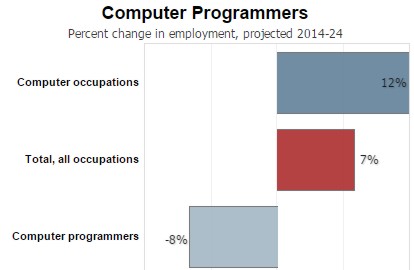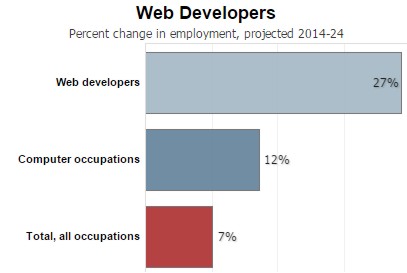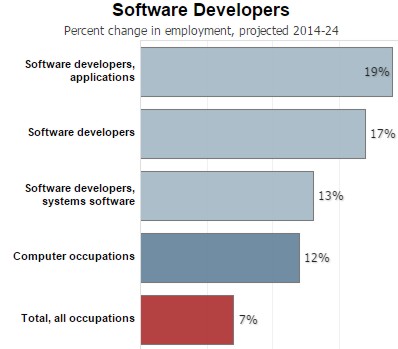| Programming Jobs To Decline? |
| Written by Sue Gee | |||
| Thursday, 31 December 2015 | |||
|
You might be panicked by the US Bureau of Labor Statistics forecast that jobs for computer programmers will decline by 8% over the coming decade. But the bigger picture is reassuring.
This month saw the biennial release of the US Bureau of Labor Statistics (BLS) Occupational Outlook Handbook which is a mine of information about jobs and careers. For each occupation it details what the job holder does, the environment they work it, the median annual wage in comparison to similar jobs and to all occupations and the job outlook. It is the Job Outlook that has attracted attention and in particular that for Computer Programmers. As this chart shows there is expected to be a decline in demand for this job role over the coming decade:
To quote from the entry: Employment of computer programmers is projected to decline 8 percent from 2014 to 2024. Computer programming can be done from anywhere in the world, so companies sometimes hire programmers in countries where wages are lower. This ongoing trend is projected to limit growth for computer programmers in the United States. However, the high costs associated with managing projects given to overseas programmers sometimes offsets the savings from the lower wages, causing some companies to bring back or keep programming jobs in the United States. So it isn't that there is less computer programming to be done it is that a proportion of it may be subject to offshoring to reduce costs. According to the BLS, most computer programmers have a bachelors degree in computer science or a related subject and their median pay is $77,500. This compares to $79,390 for all computer occupations and to $35,540 for all occupations in the US economy. So being a computer programmer pays well in the overall job landscape but is slightly below what you can expect for a computer career. So let's look at the job outlook for two closely related occupations. Web developers is seen as less skilled than computer programming, reflected in lower annual median pay ($63,490) and less demanding educational requirements - an associates degree being commonly sufficient. However the job prospects over the next decade are encouraging, despite the fact that jobs could be offshored:
Because websites can be built from anywhere in the world, some web developer jobs may be moved to countries with lower wages, decreasing employment growth. However, this practice may decline because the cost of managing web developers in multiple countries can offset the savings to businesses. Furthermore, web developers must understand cultural nuances that allow webpages to communicate effectively with users, and domestic web developers are better equipped for this task, curtailing the work that may be moved to other countries. If you possess a bachelors degree, rather than aspire to being a Computer Programmer you need to consider yourself a Software Developer. The environment is much the same but the median annual pay is superior ($97,990) and so are the job prospects, especailly if your area is applications:
I Software Developer doesn't have the same ring to it, so please continue to read I Programmer, where we'll continue to cater for all those in the business of software development, be it web, mobile or enterprise.
More InformationOccupational Outlook Handbook - Computer Occupations Related ArticlesWhat do you call a programmer? Improve Your Hiring Prospects With Computer Science Students Flocking to Computer Science
To be informed about new articles on I Programmer, sign up for our weekly newsletter, subscribe to the RSS feed and follow us on Facebook or Linkedin.
Comments
or email your comment to: comments@i-programmer.info
|
|||
| Last Updated ( Friday, 03 November 2017 ) |





